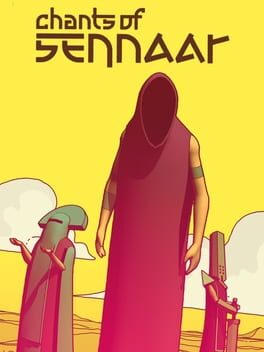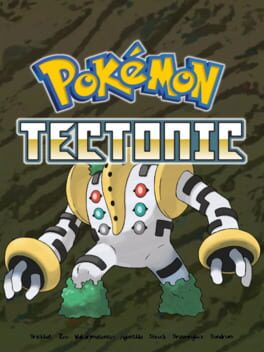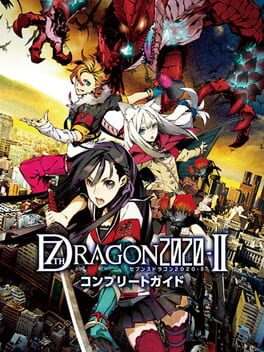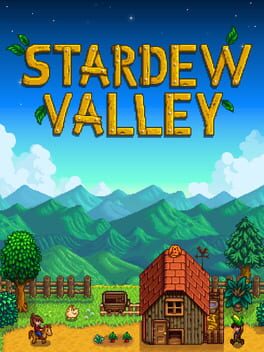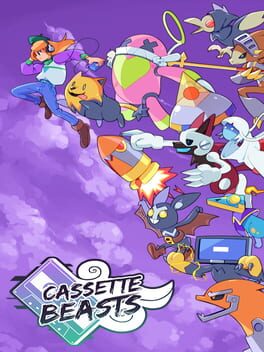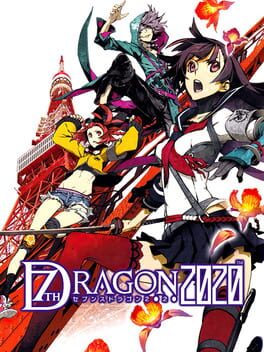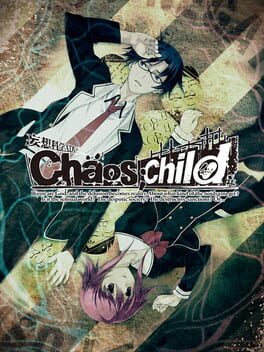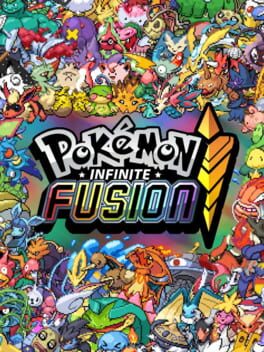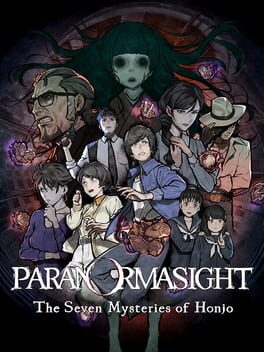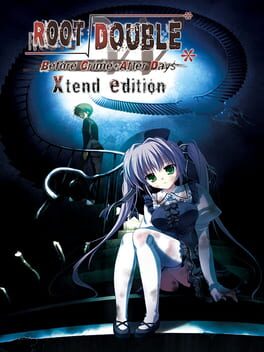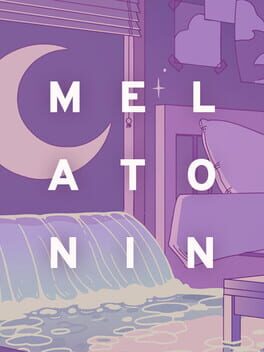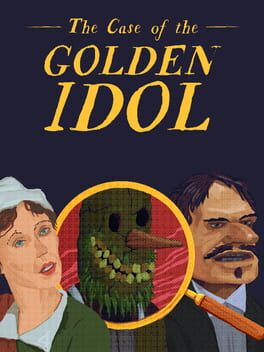LunaFlare
2023
OK, here's your hackneyed "like dark souls" comparison: it's Myst meets Obra Dinn meets Heaven's Vault. A point-and-click adventure puzzle game about using contextual inference to decipher various languages. And the game delivers on that premise fantastically, the satisfaction as your understanding of a word is confirmed by using it to solve a puzzle is unparalleled.
If I had one complaint, the stealth sections feel kind of unnecessary and out of place, but they're also fairly short, with quick and forgiving respawns, so it's kind of whatever. Some of the late game sequences also felt slightly unsatisfying, once you no longer really have anything new to grasp about the languages, but that's kind of inevitable, discovery can't last forever.
If I had one complaint, the stealth sections feel kind of unnecessary and out of place, but they're also fairly short, with quick and forgiving respawns, so it's kind of whatever. Some of the late game sequences also felt slightly unsatisfying, once you no longer really have anything new to grasp about the languages, but that's kind of inevitable, discovery can't last forever.
2023
It's hard to know how to evaluate a Bethesda game. Critically speaking, they're often riddled with shared flaws that many are quick to point out. However, they also offer an experience that's hard to find elsewhere, and in a way it's the flaws that allow that experience to flourish - where other RPGs are more indepth and engaging, Bethesda games are perfect for zoning out and bumming around an open world, and sometimes that's exactly what I need. I went into this game expecting little more, and that's exactly what I got, so I'm satisfied.
Starfield does feature some improvements over previous Bethesda games, though in some cases it could be seen as damning with faint praise. Dialogue is back after the mess of Fallout 4, character creation is looking better than ever with some actual trait choices, some of the set pieces set a new standard for exciting spectacle, and the NASA-punk setting is quite to my tastes.
The space exploration aspect is somewhat underbaked, but again this is a matter of expectations - I didn't really want a competitor to Elite: Dangerous, nor do I expect Bethesda could pull that off well. I'm glad they stuck to their strengths and most of the game takes place on the ground with the gameplay style I'm familiar with.
There are some issues worth highlighting that stuck out even to my very casual experience. I specced into Laser weapons based on the background that I wanted to go with, and then spent the entire game struggling to find weapon upgrades because so many quests reward either armour or physical weapons. Also, some systems that seem neat, like shipbuilding or outpost construction, are intimidating to get into, and the game never really works to introduce you to them, you just have to either dive in or avoid them. I got through the game fine without engaging with them, once I got a better ship from a sidequest, but it probably would have been cooler if the game did help me do more with them. The major factions outside of the main quest are also quite unappealing - two sets of cops, one megacorp, and raiders. That vastly cut down on the amount of side content I wanted to do, which is a big shame from a timewasting standpoint.
Starfield does feature some improvements over previous Bethesda games, though in some cases it could be seen as damning with faint praise. Dialogue is back after the mess of Fallout 4, character creation is looking better than ever with some actual trait choices, some of the set pieces set a new standard for exciting spectacle, and the NASA-punk setting is quite to my tastes.
The space exploration aspect is somewhat underbaked, but again this is a matter of expectations - I didn't really want a competitor to Elite: Dangerous, nor do I expect Bethesda could pull that off well. I'm glad they stuck to their strengths and most of the game takes place on the ground with the gameplay style I'm familiar with.
There are some issues worth highlighting that stuck out even to my very casual experience. I specced into Laser weapons based on the background that I wanted to go with, and then spent the entire game struggling to find weapon upgrades because so many quests reward either armour or physical weapons. Also, some systems that seem neat, like shipbuilding or outpost construction, are intimidating to get into, and the game never really works to introduce you to them, you just have to either dive in or avoid them. I got through the game fine without engaging with them, once I got a better ship from a sidequest, but it probably would have been cooler if the game did help me do more with them. The major factions outside of the main quest are also quite unappealing - two sets of cops, one megacorp, and raiders. That vastly cut down on the amount of side content I wanted to do, which is a big shame from a timewasting standpoint.
2021
Originally played on version 2.2.3, review copied from duplicate page. For what it's worth, I've warmed up more to the game since then, for reasons that are kind of vibes-based and hard to define. There are more notes on why at the bottom of the review.
This is... an interesting game. It's got a lot of good ideas, design decisions I'd usually criticise in other contexts are clearly thought through here, and I can respect them... even if there are still a lot of issues with execution. I dunno. It's a very messy game, I think, but that almost feels appropriate, given its story and major characters seem to be hugely about messy people.
It's hard to know where to start talking about the mechanics, because both good decisions and unfortunate consequences are all interlinked. So, the game has a hard level cap, which I usually really don't like. But, the move learn and evolution levels are designed around those thresholds, which is clever, the XP candy system makes sure your XP isn't wasted, which is nice, and the perfect fight mechanic encourages practicing skillful play without overlevelling.
However, you still don't gain anything from fights besides some candy you can't cash in until later. Because all of the fights are tuned to be difficult, and you're encouraged to perfect them, they feel like exhausting obstacles rather than potential reward. This is especially a problem with pacing in some long stretches between gyms with a ton of points of interest, you feel like you want to pass them all by to just get to your next cap increase ASAP. And then when you finally do, with all the candy you've saved up, you just immediately jump to your new cap. You never get that satisfying feeling of continuous, gradual progression.
The "No Pokemon Left Behind" concept is admirable in ideal, but it leads to some homogeneity, especially early-game, and it's another contributor to fights feeling dragged-out, because you're rarely going to have a distinctly better Pokemon than your opponent. I also can't actually verify how successful it was, since I tend to keep my teams small, but I liked all the Pokemon I used.
The style points system is a really really good system in concept, eliminating the randomness of IVs and the tedium of EVs - but psychologically, it feels bad to be taking points away from another stat, rather than just investing them into specialties. This isn't a massively rational reaction, but how you frame a mechanic is still an important design consideration, think about the old story of WoW's XP penalties for playing too long vs XP rewards for coming back from a break. It feels strange to say, but Style Points would feel a lot better if they all just started in a pool instead of being pre-invested.
The tone at the start of the game is eye-rollingly cynical, to the point of potentially being off-putting. Society sucks, and everyone, player character implicitly included, is kind of a piece of shit. ...Which makes it all the stranger that as the game goes on, there are plenty of compelling characters, solid arcs, and touching moments - from something as big as the main plot's motivation, to something as small as patting a scared Absol on the head. I like all of this latter stuff, but the contrast makes the first impression even more jarring.
A lot of this has been criticism because sticking points stick out, but it's worth noting the game convinced me to push through all of those issues. A lot of the new Pokemon designs are really fun, I like the unique niches given to the Pokemon I used on my team, I almost want to give the game some more playthroughs to try out other mechanics I missed like the new weathers, I'm just slightly worried about the pacing. The Avatar fights are a really fun change of pace for battles. Technically, the game is a lot more well put-together than other Pokemon Essentials games I've played, there's very little in the way of jank, lag, or any other frustration. I resent "Nintendo, hire this man", and I think there are very good reasons GF wouldn't want to implement many of the changes seen in this game, but there's enough here to say that I'd love to see the ideas iterated on in some form in the future. Worth a shot if you're looking for a good-faith shakeup, as it ultimately feels like it comes from a place of love for the series rather than spite.
-----
Having played this game a few times more since originally writing this review, I can also say a lot of these criticisms fade into the background. The pacing issues are a lot better when you already know where you're going, fights are easier now that I have more experience, and having used a wider variety of Pokemon I can confirm their designs are distinct and interesting.
This is... an interesting game. It's got a lot of good ideas, design decisions I'd usually criticise in other contexts are clearly thought through here, and I can respect them... even if there are still a lot of issues with execution. I dunno. It's a very messy game, I think, but that almost feels appropriate, given its story and major characters seem to be hugely about messy people.
It's hard to know where to start talking about the mechanics, because both good decisions and unfortunate consequences are all interlinked. So, the game has a hard level cap, which I usually really don't like. But, the move learn and evolution levels are designed around those thresholds, which is clever, the XP candy system makes sure your XP isn't wasted, which is nice, and the perfect fight mechanic encourages practicing skillful play without overlevelling.
However, you still don't gain anything from fights besides some candy you can't cash in until later. Because all of the fights are tuned to be difficult, and you're encouraged to perfect them, they feel like exhausting obstacles rather than potential reward. This is especially a problem with pacing in some long stretches between gyms with a ton of points of interest, you feel like you want to pass them all by to just get to your next cap increase ASAP. And then when you finally do, with all the candy you've saved up, you just immediately jump to your new cap. You never get that satisfying feeling of continuous, gradual progression.
The "No Pokemon Left Behind" concept is admirable in ideal, but it leads to some homogeneity, especially early-game, and it's another contributor to fights feeling dragged-out, because you're rarely going to have a distinctly better Pokemon than your opponent. I also can't actually verify how successful it was, since I tend to keep my teams small, but I liked all the Pokemon I used.
The style points system is a really really good system in concept, eliminating the randomness of IVs and the tedium of EVs - but psychologically, it feels bad to be taking points away from another stat, rather than just investing them into specialties. This isn't a massively rational reaction, but how you frame a mechanic is still an important design consideration, think about the old story of WoW's XP penalties for playing too long vs XP rewards for coming back from a break. It feels strange to say, but Style Points would feel a lot better if they all just started in a pool instead of being pre-invested.
The tone at the start of the game is eye-rollingly cynical, to the point of potentially being off-putting. Society sucks, and everyone, player character implicitly included, is kind of a piece of shit. ...Which makes it all the stranger that as the game goes on, there are plenty of compelling characters, solid arcs, and touching moments - from something as big as the main plot's motivation, to something as small as patting a scared Absol on the head. I like all of this latter stuff, but the contrast makes the first impression even more jarring.
A lot of this has been criticism because sticking points stick out, but it's worth noting the game convinced me to push through all of those issues. A lot of the new Pokemon designs are really fun, I like the unique niches given to the Pokemon I used on my team, I almost want to give the game some more playthroughs to try out other mechanics I missed like the new weathers, I'm just slightly worried about the pacing. The Avatar fights are a really fun change of pace for battles. Technically, the game is a lot more well put-together than other Pokemon Essentials games I've played, there's very little in the way of jank, lag, or any other frustration. I resent "Nintendo, hire this man", and I think there are very good reasons GF wouldn't want to implement many of the changes seen in this game, but there's enough here to say that I'd love to see the ideas iterated on in some form in the future. Worth a shot if you're looking for a good-faith shakeup, as it ultimately feels like it comes from a place of love for the series rather than spite.
-----
Having played this game a few times more since originally writing this review, I can also say a lot of these criticisms fade into the background. The pacing issues are a lot better when you already know where you're going, fights are easier now that I have more experience, and having used a wider variety of Pokemon I can confirm their designs are distinct and interesting.
2013
My thoughts on this are pretty similar to the first game - it's quite good, but it's hard for me to isolate specifics because my view is somewhat coloured, read Sympathy for Chisa Inomiko.
I will say, a notable improvement over its predecessor is the presence of the final antagonist in the story. Niara came out of nowhere, but sequences like the acid rain and Fomalhaut's raid on the Diet building are extremely memorable.
I will say, a notable improvement over its predecessor is the presence of the final antagonist in the story. Niara came out of nowhere, but sequences like the acid rain and Fomalhaut's raid on the Diet building are extremely memorable.
2016
This is more of a blog than a review, but hey, it's Stardew Valley, in 2023. I'm not the one selling you on it. Lemme ramble.
It took me quite a few tries to get into Stardew Valley. When I was first interested, I only had a Mac, and it didn't have a Mac port back then. By the time that changed, in both senses, my attention had moved on.
Later, when I thought about it again, I took at look at how people talked about the game, how it seemed to play in videos, and I was turned off - it seemed stressful and overwhelming, keeping track of all the different things to do, processing the information given, and figuring out the details, so I wasn't interested in trying it for quite a while.
Eventually, I needed a low-energy game to play, and seeing more videos about it had made me more interested, so I gave it a shot - and I was entirely right about the problems I expected, I felt really lost, like I was awkwardly fumbling through, and it wasn't enjoyable. So for players with the wrong kind of brain, it might not be a great fit - at least, vanilla.
However, that need grew and grew and so I gave it another try - but this time, with a few tips and a bunch of mods that helped me track the info, know what to do right, and relieve the pressure to plan ahead quite so much. Others might call it cheating, especially the instant storage access, but it's exactly what I needed to get into the game, and now that I finally could, I've been really enjoying it. The gameplay loop is satisfying, the systems are engaging, and the characters are charming.
Of particular note, I have some Complicated feelings lately on player romance in games, but Stardew does it basically exactly right for my tastes, a slow burn largely at the player's discretion, not assuming I'm into a character before I've demonstrated such - and giving me reasons to be so. For a fairly simple system, it's surprisingly fulfilling, at least as someone otherwise in a rough emotional spot.
I know I already assumed this isn't anyone's first exposure to Stardew, but just in case someone's in the same situation as I was and likes the sound of those mods, lemme list out some of the important ones. Billboard Anywhere lets you check the quests and calendar at any time - particularly, from your farm, so you can check what you might need to do today before committing. Chests Anywhere lets you access your chests at the press of a button - it can also be configured to be less cheaty, but I'm honestly glad to remove inventory management as a factor, I just needed that pressure reduction to personally enjoy the game. Lookup Anything lets you get a mini wiki-page on just about anything you highlight, which in particular really removed the trial and error from gifting villagers. Finally, UI Info Suite 2, amongst other features, keeps track of all sorts of reminders for periodic events, so that you don't have to worry about forgetting them. Combined, these really lift the cognitive load and make the experience as relaxing as other people already find it.
As of writing, I don't really know how to mark my playing status. I'm definitely still going, but I've finished the community centre, so I guess if I want to mark dates, from the start of this save file to now is as good as any?
It took me quite a few tries to get into Stardew Valley. When I was first interested, I only had a Mac, and it didn't have a Mac port back then. By the time that changed, in both senses, my attention had moved on.
Later, when I thought about it again, I took at look at how people talked about the game, how it seemed to play in videos, and I was turned off - it seemed stressful and overwhelming, keeping track of all the different things to do, processing the information given, and figuring out the details, so I wasn't interested in trying it for quite a while.
Eventually, I needed a low-energy game to play, and seeing more videos about it had made me more interested, so I gave it a shot - and I was entirely right about the problems I expected, I felt really lost, like I was awkwardly fumbling through, and it wasn't enjoyable. So for players with the wrong kind of brain, it might not be a great fit - at least, vanilla.
However, that need grew and grew and so I gave it another try - but this time, with a few tips and a bunch of mods that helped me track the info, know what to do right, and relieve the pressure to plan ahead quite so much. Others might call it cheating, especially the instant storage access, but it's exactly what I needed to get into the game, and now that I finally could, I've been really enjoying it. The gameplay loop is satisfying, the systems are engaging, and the characters are charming.
Of particular note, I have some Complicated feelings lately on player romance in games, but Stardew does it basically exactly right for my tastes, a slow burn largely at the player's discretion, not assuming I'm into a character before I've demonstrated such - and giving me reasons to be so. For a fairly simple system, it's surprisingly fulfilling, at least as someone otherwise in a rough emotional spot.
I know I already assumed this isn't anyone's first exposure to Stardew, but just in case someone's in the same situation as I was and likes the sound of those mods, lemme list out some of the important ones. Billboard Anywhere lets you check the quests and calendar at any time - particularly, from your farm, so you can check what you might need to do today before committing. Chests Anywhere lets you access your chests at the press of a button - it can also be configured to be less cheaty, but I'm honestly glad to remove inventory management as a factor, I just needed that pressure reduction to personally enjoy the game. Lookup Anything lets you get a mini wiki-page on just about anything you highlight, which in particular really removed the trial and error from gifting villagers. Finally, UI Info Suite 2, amongst other features, keeps track of all sorts of reminders for periodic events, so that you don't have to worry about forgetting them. Combined, these really lift the cognitive load and make the experience as relaxing as other people already find it.
As of writing, I don't really know how to mark my playing status. I'm definitely still going, but I've finished the community centre, so I guess if I want to mark dates, from the start of this save file to now is as good as any?
2023
Everyone else I know seems to absolutely adore this game, a perfect, favourite, all-timer. I couldn't get into it the same way, but I was enjoying it just well enough to keep going for a while. However, complaints mounted and mounted, and eventually one really bad spot of design frustrated me enough that I didn't have the motivation to continue.
First of all, not complaints so much, but aspects of it that I know others love but didn't help raise its score for me - The vocal soundtrack just wasn't to my personal taste, and I couldn't get as invested in the characters. I have a complicated relationship with the "wholesome queer indie game" vibe, despite being queer and wanting representation something about it often just puts me off. In particular, in this case, buddying up so intimately, so quickly with the characters made me honestly uncomfortable. "wow we fused was that your 👉👈 first time". haha get it its like sex. girl we just met.
I found the progression to be kind of awkward. There are a lot of small objectives you have to complete across the map, and it's often unclear when one's appropriate for your level. Finding the right arbitrary beasts to capture to unlock traversal abilities is poorly signposted and often out of the way, especially with swimming. And the level curve in general felt quite poorly adjusted at times, especially trying to find your way through the west of the map.
The big thing that made me ragequit was the way the game handles "legendary" beasts. While a small handful of designs really appealed to me, I was having trouble finding enough beasts I cared enough about to want on my team. When I found Glaistain, it was going to finally be a solid sixth. Unfortunately, the game made absolutely no indication that it was unique, how hard it would be to catch, or what the process for respawning it would involve - but I was promised by another player that it could respawn, so when I went in unprepared and had no hope of catching it, I didn't think to reload. Only after it was too late did I learn you have to wait for a rarely-spawning rumour in town, which from my experience is excruciatingly rare before postgame - it's not something you're supposed to be able to rely on, and I'd been left to rely on it with little warning. Unable to complete the team I wanted to play with, on top of everything else grinding me down, I lost all interest.
First of all, not complaints so much, but aspects of it that I know others love but didn't help raise its score for me - The vocal soundtrack just wasn't to my personal taste, and I couldn't get as invested in the characters. I have a complicated relationship with the "wholesome queer indie game" vibe, despite being queer and wanting representation something about it often just puts me off. In particular, in this case, buddying up so intimately, so quickly with the characters made me honestly uncomfortable. "wow we fused was that your 👉👈 first time". haha get it its like sex. girl we just met.
I found the progression to be kind of awkward. There are a lot of small objectives you have to complete across the map, and it's often unclear when one's appropriate for your level. Finding the right arbitrary beasts to capture to unlock traversal abilities is poorly signposted and often out of the way, especially with swimming. And the level curve in general felt quite poorly adjusted at times, especially trying to find your way through the west of the map.
The big thing that made me ragequit was the way the game handles "legendary" beasts. While a small handful of designs really appealed to me, I was having trouble finding enough beasts I cared enough about to want on my team. When I found Glaistain, it was going to finally be a solid sixth. Unfortunately, the game made absolutely no indication that it was unique, how hard it would be to catch, or what the process for respawning it would involve - but I was promised by another player that it could respawn, so when I went in unprepared and had no hope of catching it, I didn't think to reload. Only after it was too late did I learn you have to wait for a rarely-spawning rumour in town, which from my experience is excruciatingly rare before postgame - it's not something you're supposed to be able to rely on, and I'd been left to rely on it with little warning. Unable to complete the team I wanted to play with, on top of everything else grinding me down, I lost all interest.
2011
This is kind of a hard one to review, because I was first exposed to it through the magnificent narrative LP/fanfic Sympathy for Chisa Inomiko, and it's hard for me to separate the game-original content from that context.
That said, the game is very strong on its own merits, and I can see what compelled Sympathy's author so. The plot is surprisingly compelling and impactful, the characters are charming and memorable, and the gameplay is tight and enjoyable. Also the game deadass has Hatsune Miku in it, what more could you want? It doesn't resonate as deeply with my personal tastes as some of my favourites, hence the only 4-star rating, but that might just be because Sympathy takes its place in my heart.
That said, the game is very strong on its own merits, and I can see what compelled Sympathy's author so. The plot is surprisingly compelling and impactful, the characters are charming and memorable, and the gameplay is tight and enjoyable. Also the game deadass has Hatsune Miku in it, what more could you want? It doesn't resonate as deeply with my personal tastes as some of my favourites, hence the only 4-star rating, but that might just be because Sympathy takes its place in my heart.
This review contains spoilers
If there's one word to describe this game, it's spectacle. Not empty, vacuous spectacle, but earned spectacle. The power in the player's hands, from constructing Zonai contraptions to assembling an army of sages - including a goddamn mech. The set pieces, from the dive down to the surface, to pulling the Master Sword out of a dragon's head - out of Zelda's head. Just wonder and awe, from start to finish.
The game expertly walks the extremely fine line of listening to fan feedback without throwing out good ideas. Aspects of BOTW that I'd defend, but many complained about, are improved without sacrificing their unique benefits. Weapon durability feels less bad when the weapons are all weak and their power comes from your monster horn collection. The dungeons feature unique mechanics you get to keep, without sacrificing the ability to do them in any order. I also enjoyed the more structured plot for players who want to follow it, while still allowing the freedom to jump down the pit and attempt the final boss shortly after the tutorial.
I have absolutely no qualms with the re-use of the world map. Even in familiar locales, I barely recognised them as the same place. Hyrule's recovery after the Calamity, and new damage in the Upheaval, is a really compelling thing to see, much moreso in my opinion than starting from scratch a second time. And if you're really craving brand-new content, you've got not only the sky islands, but also a whole second map to explore in the Depths.
There are countless other things I could mention, but there are countless other players to cover them, and these are the things that stood out most to me. One hell of a game.
The game expertly walks the extremely fine line of listening to fan feedback without throwing out good ideas. Aspects of BOTW that I'd defend, but many complained about, are improved without sacrificing their unique benefits. Weapon durability feels less bad when the weapons are all weak and their power comes from your monster horn collection. The dungeons feature unique mechanics you get to keep, without sacrificing the ability to do them in any order. I also enjoyed the more structured plot for players who want to follow it, while still allowing the freedom to jump down the pit and attempt the final boss shortly after the tutorial.
I have absolutely no qualms with the re-use of the world map. Even in familiar locales, I barely recognised them as the same place. Hyrule's recovery after the Calamity, and new damage in the Upheaval, is a really compelling thing to see, much moreso in my opinion than starting from scratch a second time. And if you're really craving brand-new content, you've got not only the sky islands, but also a whole second map to explore in the Depths.
There are countless other things I could mention, but there are countless other players to cover them, and these are the things that stood out most to me. One hell of a game.
2014
Oh geez, where do I begin?
I think the best way to put it is such: this is a game I wish I could hate. Unfortunately, its highs are too high, even if there are so many lows. The climax to the common route is compelling and thematically interesting, while Nono's route is legitimately heartwarming. For all I'm going to complain about writing and characters below, when they're trying to make an actually good person, I couldn't help but get attached.
However, the other character routes vary from a complete swerve in the game's focus, to "what the fuck am I looking at?". I'm not sure if the true ending connected with me, I'm still sitting on it, but it's certainly doesn't have the immediately obvious quality of my favourite routes.
The game is full to the brim with all the worst associations of the anime aesthetics. Even outside of the extremely offputting "positive delusions", there are constant eye-rolling jokes, general creepiness, and just a sense of "why did this need to be included". Need I remind you that this game is largely set at a school.
While I'm aware it's intentional, characters like Takuru and Itou are intolerable to put up with, especially early-game, and between Takuru's magazines and the online forums, the writers seem to have a great insight to the minds of the worst kinds of people. Some of the stuff I read made me feel sicker than any of the gore the game is known for.
On that note, the delusion system is kind of weak. Besides all of the content just being offputting, speeding through the entire game to redo a handful of choices, without a chapter skip or anything, is very tedious, and for all but one route it boils down to "positive delusion on the focus character". Only a handful of negative delusions are ever required, for one route in particular, so outside of that I just... never opted into one? And never felt like I was missing out. So it felt disjointed. Not to repeat myself, but I wish I could have skipped out on more positive delusions... It doesn't help that your reward for all of this is the largely-weak character routes.
There are some games I get anxious to recommend, because while I love them, they're flawed, and they contain offputting content, and mostly I love these games despite that, having to overlook them for what they do best. In this case, the offputting content is so overwhelming, the best parts so buried underneath it, that I could not imagine telling my friends to play this game. But I can't just discard it, I can't hate it like I wish I could, because damn it I'm glad Nono Kurusu's story exists. Still, I've always been wary of the Sci;ADV series and this does not give me the courage to take another chance on it.
I think the best way to put it is such: this is a game I wish I could hate. Unfortunately, its highs are too high, even if there are so many lows. The climax to the common route is compelling and thematically interesting, while Nono's route is legitimately heartwarming. For all I'm going to complain about writing and characters below, when they're trying to make an actually good person, I couldn't help but get attached.
However, the other character routes vary from a complete swerve in the game's focus, to "what the fuck am I looking at?". I'm not sure if the true ending connected with me, I'm still sitting on it, but it's certainly doesn't have the immediately obvious quality of my favourite routes.
The game is full to the brim with all the worst associations of the anime aesthetics. Even outside of the extremely offputting "positive delusions", there are constant eye-rolling jokes, general creepiness, and just a sense of "why did this need to be included". Need I remind you that this game is largely set at a school.
While I'm aware it's intentional, characters like Takuru and Itou are intolerable to put up with, especially early-game, and between Takuru's magazines and the online forums, the writers seem to have a great insight to the minds of the worst kinds of people. Some of the stuff I read made me feel sicker than any of the gore the game is known for.
On that note, the delusion system is kind of weak. Besides all of the content just being offputting, speeding through the entire game to redo a handful of choices, without a chapter skip or anything, is very tedious, and for all but one route it boils down to "positive delusion on the focus character". Only a handful of negative delusions are ever required, for one route in particular, so outside of that I just... never opted into one? And never felt like I was missing out. So it felt disjointed. Not to repeat myself, but I wish I could have skipped out on more positive delusions... It doesn't help that your reward for all of this is the largely-weak character routes.
There are some games I get anxious to recommend, because while I love them, they're flawed, and they contain offputting content, and mostly I love these games despite that, having to overlook them for what they do best. In this case, the offputting content is so overwhelming, the best parts so buried underneath it, that I could not imagine telling my friends to play this game. But I can't just discard it, I can't hate it like I wish I could, because damn it I'm glad Nono Kurusu's story exists. Still, I've always been wary of the Sci;ADV series and this does not give me the courage to take another chance on it.
2021
Very cool concept with a very strong start - it's not actually very hard to get away with it, but the game pushes you towards more stringent goals that are harder to achieve. Unfortunately I kind of lost the flow - the game has a system where it keeps track of leads to follow up on, and presumably you're supposed to be able to dedicate a loop to solving them, then act on them later. But I found it hard to resist the compulsion to make every loop as perfect as possible - do everything I did well from the previous, in addition to following my new lead. And that got tedious fast. When I stepped away from the game and recentered, coming back felt like jumping in the deep end.
also as a lesbian i wish you didn't have to "let the captain take the wheel" but whatever its the 30s
also as a lesbian i wish you didn't have to "let the captain take the wheel" but whatever its the 30s
So, obviously the core appeal here is the Pokemon Fusions. This idea is kind of self-evidently really cool, and there's a lot of room for experimentation, both with mechanically interesting or busted combinations, and seeking out combinations that come with really cool sprites. Unfortunately, I find that these two goals clash pretty hard. Pokemon has always had a tension between optimisation and aesthetics, but it comes into sharp focus here, especially due to the fangame difficulty (more on that later). I find it frustrating how often I went to check a fusion, and only the vastly worse version had a custom sprite. I understand that the custom sprites come from community contributions, and the number they have already is beyond impressive. It's just a shame, kind of a natural limitation of the concept, that you're never going to have even a tiny fraction of the fusions look good. On the topic of natural limitations, this one is just bad luck on my part, but so many of my favourite Pokemon aren't in the dex. I totally understand the requirement for a limited scope, every single Pokemon added is exponentially more data to store, it's just the choice of which Pokemon get in to that limited roster that doesn't resonate with me personally.
Overall, I've always found the play experience of Pokemon Essentials games to be pretty janky, and this is no exception. Long loads, abrupt transitions, non-looping music, busted collision everywhere, and it's almost impossible to move exactly one tile during speed-up. But, again, I understand the limitations here. No GBA ROM can ever contain the data for [420 choose 2] Pokemon, even with all the decompilation efforts that make ROMhacks otherwise a much better choice these days.
As someone with a lot of backlash and bitterness for genwunning, it's a great disappointment that the game is set in a retread of Kanto. I'm grateful Modern Mode exists to at least update the Pokemon distribution, but it can only do so much. I guess I don't know what I would have preferred - an OC region would vastly distract from the game's focus, and any other canon region would feel like a particularly arbitrary choice. Still, there are some inexplicable archaic decisions left over from the originals, like Lt Surge's gym puzzle or the presence of Sokoban puzzles with random encounters in Victory Road - especially baffling since other things are changed, like Saffron being gated by Rocket events in Celadon instead of. there only being one source of potable water in the region. I would have liked to see more of the experience modernised and streamlined, especially since the vast number of possible Fusion combinations should make the game extremely replayable otherwise.
As stated, I played on Modern Mode, so I can't comment on the vanilla, hopefully better-designed gameplay, but the important Trainer battles in this game can be kinda wack sometimes. Modern Mode changes every Gym's type, which makes sense for replayability, but dialogue is unchanged so you have to just sort of intuit it from the Gym trainers. And then for the Elite Four, you're going in without any idea. The Elite Four and Champion are also way overtuned, with Legendaries a plenty and a sharp level spike. Peak Pokemon fangame design. The Giovanni fight in Celadon is also a sudden level bump. This game shouldn't try to be particularly more difficult than canon, finding overpowered fusions should enjoyably break the game, not be an requirement to succeed without tedium.
I find the OC plot insertions to be lightly cringy but mostly inoffensive - and as with the Celadon example above, sometimes positive. Still, it ties Fusion into the game's plot and keeps things mostly coherent, and it otherwise probably the game's least important focus, so I'm not fussed.
Overall, the concept is incredibly novel and executed... well enough to enjoy, but there are enough marks against the game in various areas to keep me from being terribly enthusiastic about it as an overall experience.
----
I haven't played much of the postgame yet, but I had to come back to amend my review because it is absolutely awful so far, all of the worst parts of the main game distilled. Modern Mode continues the legendary spam more vigorously than ever, with random trainers on the road now having them. There are multiple Zekroms just in the one Gym! And I'm supposed to take a subplot about Eusine searching for the one Suicune seriously when the Gym Leader just has a second one? A subplot in which, might I add, Eusine's characterisation is completely inconsistent both to the canon games and just between different cutscenes.
The dungeon design has also taken a nosedive into tedium. I hate both Gym puzzles I've seen so far. One is a trial-and-error Simon says game, and the other involves wind periodically pushing you off platforms - with no visual cue, a bad audio cue, and the wind firing far too often, with a fall being a punishing waste of time.
Overall, I've always found the play experience of Pokemon Essentials games to be pretty janky, and this is no exception. Long loads, abrupt transitions, non-looping music, busted collision everywhere, and it's almost impossible to move exactly one tile during speed-up. But, again, I understand the limitations here. No GBA ROM can ever contain the data for [420 choose 2] Pokemon, even with all the decompilation efforts that make ROMhacks otherwise a much better choice these days.
As someone with a lot of backlash and bitterness for genwunning, it's a great disappointment that the game is set in a retread of Kanto. I'm grateful Modern Mode exists to at least update the Pokemon distribution, but it can only do so much. I guess I don't know what I would have preferred - an OC region would vastly distract from the game's focus, and any other canon region would feel like a particularly arbitrary choice. Still, there are some inexplicable archaic decisions left over from the originals, like Lt Surge's gym puzzle or the presence of Sokoban puzzles with random encounters in Victory Road - especially baffling since other things are changed, like Saffron being gated by Rocket events in Celadon instead of. there only being one source of potable water in the region. I would have liked to see more of the experience modernised and streamlined, especially since the vast number of possible Fusion combinations should make the game extremely replayable otherwise.
As stated, I played on Modern Mode, so I can't comment on the vanilla, hopefully better-designed gameplay, but the important Trainer battles in this game can be kinda wack sometimes. Modern Mode changes every Gym's type, which makes sense for replayability, but dialogue is unchanged so you have to just sort of intuit it from the Gym trainers. And then for the Elite Four, you're going in without any idea. The Elite Four and Champion are also way overtuned, with Legendaries a plenty and a sharp level spike. Peak Pokemon fangame design. The Giovanni fight in Celadon is also a sudden level bump. This game shouldn't try to be particularly more difficult than canon, finding overpowered fusions should enjoyably break the game, not be an requirement to succeed without tedium.
I find the OC plot insertions to be lightly cringy but mostly inoffensive - and as with the Celadon example above, sometimes positive. Still, it ties Fusion into the game's plot and keeps things mostly coherent, and it otherwise probably the game's least important focus, so I'm not fussed.
Overall, the concept is incredibly novel and executed... well enough to enjoy, but there are enough marks against the game in various areas to keep me from being terribly enthusiastic about it as an overall experience.
----
I haven't played much of the postgame yet, but I had to come back to amend my review because it is absolutely awful so far, all of the worst parts of the main game distilled. Modern Mode continues the legendary spam more vigorously than ever, with random trainers on the road now having them. There are multiple Zekroms just in the one Gym! And I'm supposed to take a subplot about Eusine searching for the one Suicune seriously when the Gym Leader just has a second one? A subplot in which, might I add, Eusine's characterisation is completely inconsistent both to the canon games and just between different cutscenes.
The dungeon design has also taken a nosedive into tedium. I hate both Gym puzzles I've seen so far. One is a trial-and-error Simon says game, and the other involves wind periodically pushing you off platforms - with no visual cue, a bad audio cue, and the wind firing far too often, with a fall being a punishing waste of time.
Wow, wow, wow. I started the game not expecting to be swept up in the hype, and then every 10 minutes some new cool thing happened that had me excited and gobsmacked. The atmosphere is immaculate, the mystery is compelling, the characters are appealing. The visual style is really distinctive, though I worry about accessibility for those who experience eye strain. I really appreciate the acuity of the characters, putting details together and working cooperatively, not cluelessly dragging out a mystery for a long time. The metanarrative touches are also extremely, extremely cool. The game's a little short, but that helps with the brisk pacing, and the game is priced accordingly.
I'm sorry to say I'm not a big fan of this at all. They try to ratchet up the tension with an extreme situation, but most of the relevant route is spent with characters facing the same issues over and over, diluted by unnecessary, pandering, and extremely out of place dating mechanics. Attempts at thematic character studies are undermined by flat, tropey writing, and the story's grand climax is riddled with awful pacing due to a plot-driven over-reliance on repetitive, extensive flashbacks. The conclusion doesn't hit home, in my experience, because the reader hasn't been invested in the build-up.
Besides these overall structure issues, the moment to moment writing also has a litany of problems. Between insecure, on-the-nose lectures about themes or imagery, over-the-top technobabble to justify mechanics far beyond necessity, characters being freely forgiven or even thanked for absolutely awful decisions, and constant punching down to the female characters, it's all around clunky and unpleasant to read.
The music is relatively forgettable by genre standards (I noticed the composer isn't exactly prolific) and the art style is a lot more generically "anime" than feels appropriate, with several character designs being pure pandering. Kind of undermines the trustworthy, stoic firefighter when she's walking around in a constant boob shelf pose. The CG art for action scenes is particularly wonky, you can tell where the artist's priorities lie instead.
The Senses Sympathy System is an interesting take on the usual choice system for a VN, but it doesn't feel like it reaches its potential. The correct answer to raise favour with a character is almost always to put that character at max, while the "sense of self" which often affects bad endings is unclear and inconsistent in whether it represents brash self-confidence or measured self-care. Most of the harder branches in the game rely more on collecting event flags rather than in depth SSS choices. And the whole enneagram framing ties into that insecurity I mentioned where they feel the need to beat you over the head with their imagery to make it clear.
Besides these overall structure issues, the moment to moment writing also has a litany of problems. Between insecure, on-the-nose lectures about themes or imagery, over-the-top technobabble to justify mechanics far beyond necessity, characters being freely forgiven or even thanked for absolutely awful decisions, and constant punching down to the female characters, it's all around clunky and unpleasant to read.
The music is relatively forgettable by genre standards (I noticed the composer isn't exactly prolific) and the art style is a lot more generically "anime" than feels appropriate, with several character designs being pure pandering. Kind of undermines the trustworthy, stoic firefighter when she's walking around in a constant boob shelf pose. The CG art for action scenes is particularly wonky, you can tell where the artist's priorities lie instead.
The Senses Sympathy System is an interesting take on the usual choice system for a VN, but it doesn't feel like it reaches its potential. The correct answer to raise favour with a character is almost always to put that character at max, while the "sense of self" which often affects bad endings is unclear and inconsistent in whether it represents brash self-confidence or measured self-care. Most of the harder branches in the game rely more on collecting event flags rather than in depth SSS choices. And the whole enneagram framing ties into that insecurity I mentioned where they feel the need to beat you over the head with their imagery to make it clear.
2022
I'm afraid that after giving this game a chance for a while, I just kind of don't really like it? I find the tone and aesthetic actively unappealing, I'm not interested in some schlubby family guy reject dreaming about consumption, and the music was generic "lo-fi beats to study to". The obvious comparison for this game is Rhythm Heaven, and while there's obviously no reason it had to be aesthetically similar, the music in the latter is far more varied and memorable beyond just facilitating the rhythm games.
The gameplay isn't as objectionable but I do still have some complaints. For one, the presence of hard modes encourages you to play the games twice in a row even if you're perfectly successful, which is kind of tedious. In terms of specific levels, I particularly disliked Work, where you had to react to certain sound cues with the correct button, but the sound cues blended into the background music which make heavy use of similar sound effects. I only got through it by following the visual cues which isn't ideal for this kind of game. I also didn't like how Money relied on either visual cues or 3D audio, which is not so much a musical skill so much as a tech check ("are you wearing headphones?"). The presence of multiple call-and-response games disappointed me too, I find that style to be kind of boring, and again they primarily test things other than rhythm or musicality, which I feel should be the focus.
The gameplay isn't as objectionable but I do still have some complaints. For one, the presence of hard modes encourages you to play the games twice in a row even if you're perfectly successful, which is kind of tedious. In terms of specific levels, I particularly disliked Work, where you had to react to certain sound cues with the correct button, but the sound cues blended into the background music which make heavy use of similar sound effects. I only got through it by following the visual cues which isn't ideal for this kind of game. I also didn't like how Money relied on either visual cues or 3D audio, which is not so much a musical skill so much as a tech check ("are you wearing headphones?"). The presence of multiple call-and-response games disappointed me too, I find that style to be kind of boring, and again they primarily test things other than rhythm or musicality, which I feel should be the focus.
This was pretty good! The deduction mechanics feel quite like Return of the Obra Dinn, but it's also very much its own thing, which is great, even if its narrative structure feels a bit less compelling. It felt a bit short, but that's understandable given its indie status, and the general difficulty of crafting tight mysteries. I particularly appreciated how looking closely at details to solve individual mysteries incidentally exposes you to the overarching plot, which you eventually need to get your head around to clutch things out. A very satisfying and cerebral experience.
